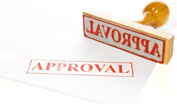FHA - Closing & Mtg. Insurance
What happens after I've applied for my loan?
It usually takes a lender between 1-4 weeks to complete the evaluation of your application. Often a lender will ask for more information once the application has been submitted. The sooner you can provide the information the faster your application will be processed. Once all the information has been verified the lender will call you to let you know the outcome of your application. If the loan is approved, a closing date is set up and the lender will review the closing with you. And after closing, you\'ll be able to move into your new home.
What should I look out for during the final walk-through?
The walk-through prior to settlement will likely be the first opportunity to examine the house without furniture, giving you a clear view of everything. Check the walls and ceilings carefully, as well as any work the seller agreed to do in response to the inspection. Any problems discovered previously that you find uncorrected should be brought up prior to closing. It is the seller\'s responsibility to fix them.
What are pre-paid expenses and closing costs?
There may be closing cost customary or unique to a certain locality, but closing cost is usually made up of the following:
- Attorney's or escrow fees (Yours and your lender\'s if applicable)
- Property taxes (to cover tax period to date)
- Interest (paid from date of closing to 30 days before first monthly payment)
- Loan Origination fee (covers lenders administrative cost)
- Recording fees
- Survey fee
- First premium of mortgage insurance (if applicable)
- Title Insurance (yours and lender's)
- Loan discount points
- First payment to escrow account for future real estate taxes and insurance
- Paid receipt for homeowner's insurance policy (and fire and flood insurance if applicable)
- Any documentation preparation fees
- Appraisal fee
- Credit Report
What can I expect to happen on closing day?
You will present your paid homeowner's insurance policy or a binder and receipt showing that the premium has been paid. The closing agent will then list the money you owe the seller (remainder of down payment, prepaid taxes, etc.) and then the money the seller owes you (unpaid taxes and prepaid rent, if applicable). The seller will provide proofs of any inspection, warranties, etc.
Once you're sure you understand all of the documentation, you'll sign the mortgage, agreeing that if you do not make payments the lender is entitled to sell your property and apply the sale price against the amount you owe plus expenses. You\'ll also sign a mortgage note, promising to repay the loan. The seller will give you the title to the house in the form of a signed deed.
You'll pay the lender's agent all closing costs and, in turn, he or she will provide you with a settlement statement of all the items for which you have paid. The deed and mortgage will then be recorded in the state Registry of Deeds and you will be a homeowner.
What do I get at closing?
Settlement Statement, HUD-1 Form is given at or before closing if live closing and within 48 hours after closing in an escrow state. If you want a copy prior to closing for review, you must request it from the closing agent.
Copy of Truth-in-Lending Statement
Copy of Mortgage Note
Copy of Mortgage or Deed of Trust
Keys to your new home
FHA - MORTGAGE INSURANCE
What is mortgage insurance (MIP)?
Mortgage insurance is a policy that protects lenders against some or most of the losses that result from defaults on home mortgages. It is required primarily for borrowers making a down payment of less than 20%.
How does mortgage insurance work? Is it like home or auto insurance?
Like home or auto insurance, mortgage insurance requires payment of a premium; it is for protection against loss and is used in the event of mortgage loan default. If a borrower can't repay an insured mortgage loan as agreed, the lender may foreclose on the property and file a claim with the mortgage insurer for some or most of the total losses.
What is PMI?
PMI stands for Private Mortgage Insurance or Insurer. These are privately-owned companies that provide mortgage insurance. They offer both standard and special affordable programs for borrowers. These companies provide guidelines to lenders that detail the types of loans they will insure. Lenders use these guidelines to determine borrower eligibility. PMI's usually have stricter qualifying ratios and larger down payment requirements than the FHA, but their premiums are often lower and they insure loans that exceed the FHA limit.
NOTE: This information was found on the official Federal Housing Authority website. For more information, visit www.fha.gov.
FHA's DISCLAIMER: All policy information contained in this knowledge base article is based upon the referenced HUD policy document. Any lending or insuring decisions should adhere to the specific information contained in that underlying policy document.
Approval Center: Get prequalified today!

